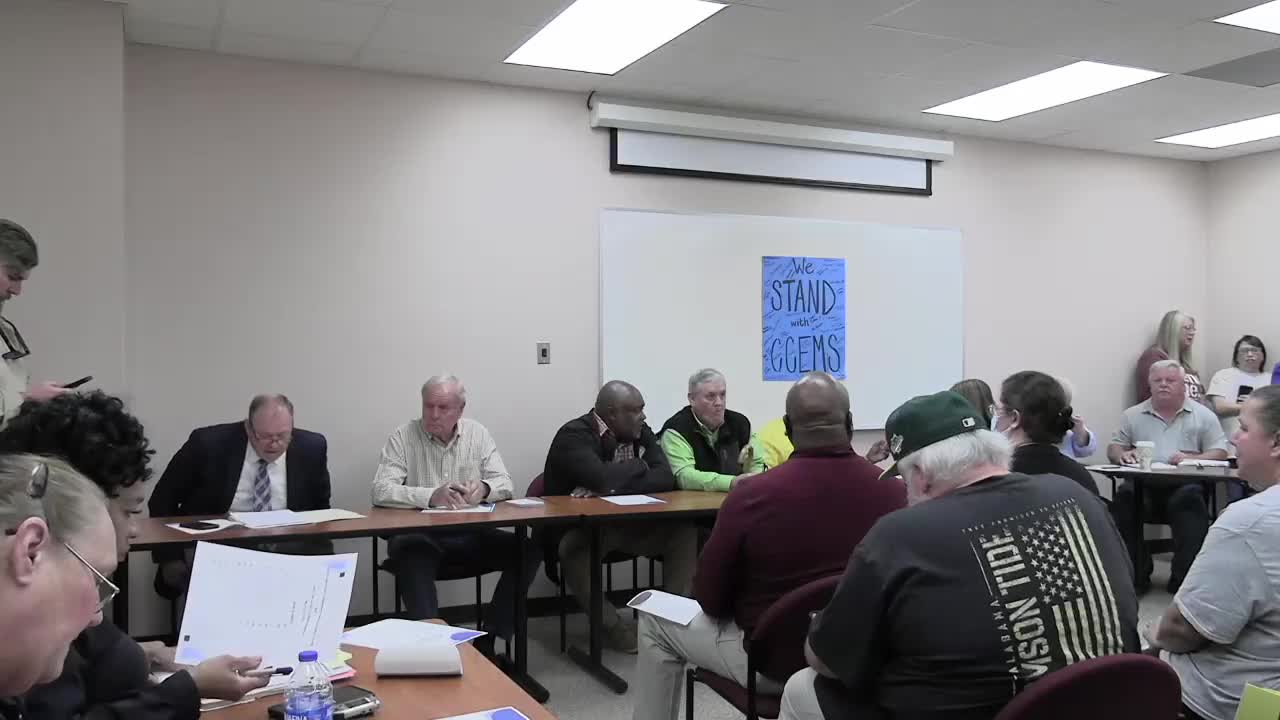Choctaw County officials agree to work session after tense discussion of 9-1-1 funding and staffing
Get AI-powered insights, summaries, and transcripts
Subscribe
Summary
County commissioners and the EMS board held a joint meeting focused on a shortfall in 9-1-1 funding, the goal of two dispatchers per shift, training and equipment needs, and a request for more financial transparency. The board agreed to a pre-meeting work session and requested updated financial statements.
Choctaw County officials and the county’s EMS board agreed to meet for a work session after a lengthy joint meeting dominated by a shortfall in funding for the county 9-1-1 service and debate over staffing and training.
The meeting focused on a requested supplement that the 9-1-1 board said it expected after receiving a similar amount the prior year. ‘‘Our budget for 9-1-1 is around a little over $600,000 for this year,’’ the 9-1-1 presenter said, and added that the board had expected to receive $200,000 from the county as it had the prior year. ‘‘We only got 50 for this year. So those numbers ... are gonna be a hundred and 50 short,’’ the presenter said.
The shortfall has concrete operational consequences, the 9-1-1 staff and board members said. The service’s stated goal is to staff two dispatchers per shift; without the $200,000 level of county support the board said it cannot sustain that staffing plan. The 9-1-1 director described why two dispatchers matter in practice: ‘‘It’s not just the phone calls. It’s also an addressing system. They enter warrants, they do gun permits, they’re over the NCIC... It’s more than just phone calls,’’ the director said.
Board members and commissioners pressed for clearer accounting and documentation. Commissioners and municipal representatives repeatedly asked for up-to-date financial statements and for an audit or line-item detail showing what municipal contributions have been and how revenues and expenditures are being spent. One commissioner noted that some municipalities in prior years contributed between $10,000 and $15,000 and said the municipal funding line on the audit looked much lower than those contributions.
On service volume and staffing needs, 9-1-1 staff said the system filters about 7,000 calls a year—roughly 19 calls per day on average—and that the workload can spike unpredictably. The director recounted scenarios where a single complex incident (for example, an entrapment alongside other simultaneous incidents) can overwhelm a single dispatcher. The director also described educating callers, supporting law enforcement and sending Amber Alerts or BOLOs as regular duties for dispatch staff.
Commissioners and the EMS board discussed potential revenue and grant sources. The group noted that state 9-1-1 equipment grants had been paused by recent legislative language and that opioid-settlement grants carry usage restrictions that may make them unsuitable for broad 9-1-1 staffing support without an Attorney General opinion. Officials said they continue to pursue grants and municipal agreements and that some towns that rely on the county dispatch service have been asked to contribute but had not been approached uniformly.
Training and equipment were also discussed. Officials said the state training course (referred to in the meeting as the E&D/EMD course) currently requires travel costs but has no tuition charge; certification cycles were mentioned as every two years. The board said some certifications and equipment licensing (NCIC/ALIA/FBI audits) carry annual costs shared by law-enforcement agencies.
Actions taken: commissioners and the EMS board agreed—by a motion and voice vote—to hold a work session one hour before the commission’s next scheduled meeting to review a redlined contract and updated financial statements. The board requested a detailed balance sheet and income statement for the year ending 2024 and said it would circulate proposed contract language to be reviewed and redlined in the work session. The meeting record shows the motion carried by voice; no roll-call tally was recorded in the transcript.
Why it matters: county leaders said preserving 9-1-1 staffing is a matter of public safety and continuity of ambulance services. Several commissioners emphasized that a stable dispatch operation underpins emergency medical response across multiple towns and fire departments that rely on the county system.
The boards set a follow-up timeline: a work session to be scheduled before the next commission meeting (Geraldine stated the next scheduled meeting date as April 24 during the discussion). The commission asked the 9-1-1 board to provide the requested 2024 year-end financial statements and the 9-1-1 board said it will provide budget documents and other supporting materials to inform the contract and funding discussion.
The meeting closed with the motion to hold the pre-meeting work session carried by voice vote.
